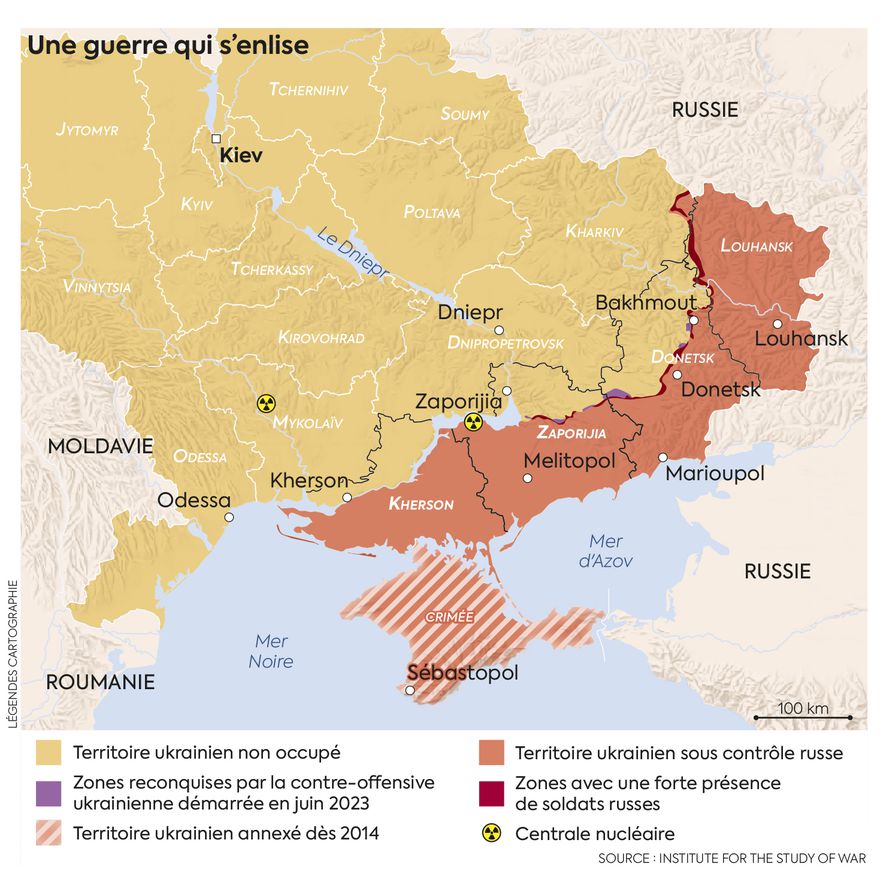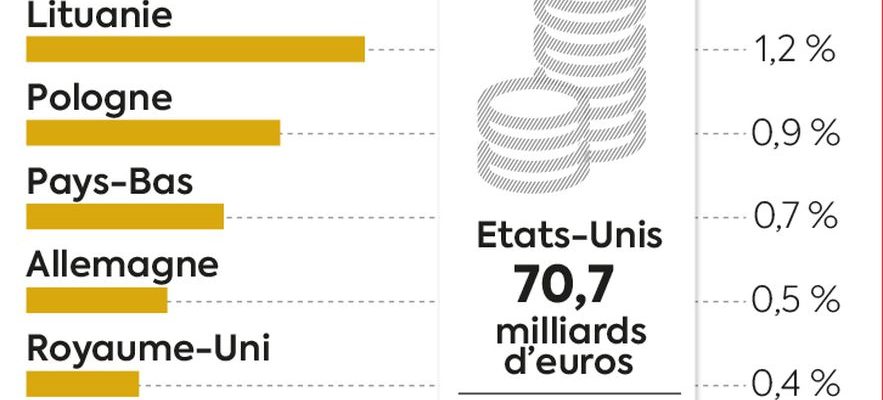To give themselves courage and try to draw a future, a question is on the lips of all Ukrainians: “And you, what will you do when it’s over, on Victory Day?” Masi, a 42-year-old lawyer injured in the eye in combat, has already spotted a small sailboat in Finland on the Internet, which he has promised himself to operate. In Lviv, Natalia imagines her husband, who took up arms at the start of the war, finally playing with his son. At 3 years old, the little one has already spent half his life without his father, to whom he only speaks behind a screen. As for Iryna, who fled her city of Donbass, occupied by the Russians, she would simply like to be able to return to her home, take care of her garden, pick her grapes.
These hopes still seem very distant. A year and a half after the start of the invasion, the Russian army still occupies 17.5% of Ukrainian territory. Kiev is counting on its counter-offensive started in June to repel the enemy, but, in the absence of air support, it comes up against Russian defense lines fearfully protected by minefields, rows of trenches and “dragon’s teeth”. A breakthrough towards the Sea of Azov, which would put Crimea under pressure, currently seems complicated, even if everything remains possible. “The Russians are in a defensive posture, which is simpler than being on the offensive. A stalemate seems to be setting in, with some progress on the Ukrainian side, but also potentially on the Russian side”, summarizes Fabrice Pothier , former director of political planning at NATO and chairman of Rasmussen Global, which advises the Ukrainian government.
The war will last
The idea now prevails: the war will continue in 2024, or even beyond. The Ukrainian army is preparing to face another winter under the fire of Russian artillery, the third in a row, which promises to be trying. Some voices, like ex-president Nicolas Sarkozy, are rising to push for concessions. But for Ukrainians, who hope to reclaim their lands, including Crimea, surrender is out of the question. They have lost too much to give up. At this stage, kyiv considers that any ceasefire agreement would allow Moscow to reconstitute its forces, before relaunching an attack. Vladimir Putin, he put on the wear and tear of the opponent, the weariness of Westerners. And presumably on the election of a Republican to the White House in November 2024, which would reduce American support and require compromises from Ukrainians.
© / art press
Despite the “fog of war”, in kyiv as in Western chancelleries, we are already thinking about the aftermath. It is indeed today that it is preparing, in the same way as the conferences of Bretton Woods and Yalta took place before the end of the Second World War. Ukrainian officials also paraphrase Georges Clemenceau, November 11, 1918: after the war, “we will have to win the peace, and it may be more difficult”.
Build an “impassable wall” against a neo-imperialist Russia
The challenges will be immense, in this country devastated by the bombs; haunted by hundreds of thousands of wounded or traumatized veterans; and sharing 1,500 kilometers of border with a neighbor who will not give up its aggressiveness if its regime remains. How can Ukraine be assured that it will not suffer another attack? President Volodymyr Zelensky did not hide his frustration after the last NATO summit in Vilnius in July. Unlike France, the United States opposes kyiv’s entry into the Alliance. It remains to be seen whether the next summit, in a year’s time, will allow progress. For several analysts, joining this club is the most reassuring solution for the Ukrainians and the clearest vis-à-vis the Russians. “Faced with Putin’s desire to go all the way, there is no other valid long-term response than to build an impassable ‘wall’ between a neo-imperialist Russia and a democratic Ukraine”, argues Fabrice Pothier, president of Rasmussen Global, which advises the Ukrainian government.

© / mapping legends
This presupposes the cessation of hostilities. With, at the very least, to be accepted by the Ukrainians, a return to the situation before February 24, 2022. “We could proceed as for West Germany, which joined NATO in 1955, in full cold war, argues François Heisbourg, special adviser to the Foundation for Strategic Research. The conflict was not settled, and yet the USSR did not make it a casus belli.” And the former diplomat added that this scheme does not exclude a peaceful reunification project, as was the case across the Rhine. Another option, much more unstable, an “Israeli” scenario, with bilateral agreements, and the promise to help Ukraine to defend itself.
In addition to settling the security issue, a Herculean task that will take decades awaits Ukraine: the reconstruction of housing, roads, schools, hospitals; economic recovery; the fight against poverty… A bill of more than 400 billion dollars, according to the World Bank. Without forgetting the gigantic task of demining agricultural land.
The scourge of corruption to eradicate
The United States, the European Union and the IMF have pledged their aid for as long as necessary. But, given the sums at stake, it will also be necessary to convince private investors, by reassuring them about Ukraine’s ability to curb corruption. Several scandals have erupted recently. The government, which has created anti-corruption institutions, has just dismissed all the regional officials in charge of military recruitment, accused of “illegal enrichment”. Progress has been made, but this scourge remains systemic in certain sectors, such as justice. “If we recover our lands but no reform is made, Russia will have won,” stings Serhiy Prytula, head of one of the country’s main NGOs in Kiev. In any case, Ukraine will have no choice: it will have to make these changes for the integration into the EU which is essential for its future.
Another crucial mission: to bring back the 6.3 million Ukrainians who have left the country, by offering them a job. To attract them, democratic life will have to resume its normal course. “It is unthinkable to hold elections without restoring freedom of expression, hampered by martial law, and without freedom of the media,” insists Volodymyr Yavorskyy, a Ukrainian lawyer. Confidence in the state has been established, “but Ukraine will have to transform its governance structure, inherited from the Soviet era, very vertical and centralized. It is inefficient and unsuited to the functioning of society”, adds Yevhen Hlibovytsky , analyst at Nestor, a group of experts working on the future of Ukraine.
But the main difficulty will be to maintain the unity of the people, while the factors of division will not be lacking. Between those who fled abroad and those who fought. Between the patriots and those who collaborated with the Russians. Between civilians and men returning from the front. “Many people today are afraid to come into contact with soldiers who have returned from the war injured, amputated, or with psychological problems. The country will have to make a lot of effort to integrate these veterans”, anticipates the writer Andrei Kurkov. “Our society can find itself crushed by war and never recover. Not losing our inner solidarity will be a great challenge”, adds the Ukrainian philosopher Volodymyr Yermolenko.
In the streets of Kiev, a wild exhibition brings together “war trophies” collected from Russian soldiers: helmets, gloves, rocket launchers… Before entering, you are encouraged to trample a Russian flag lying on the ground, while muddy. A dummy in enemy uniform hangs from the gate, a noose around his neck… 78% of Ukrainians have close relatives or friends who were injured or killed because of the Russian invasion. They will have a hard time forgiving. “Hate will swell in families who have lost a son, a husband, a father. It may be necessary to wait for the children of those who fought, so that this feeling subsides”, underlines Andreï Kurkov. Before that, a whole people waits for military successes, to tell itself that it hasn’t suffered for nothing.
